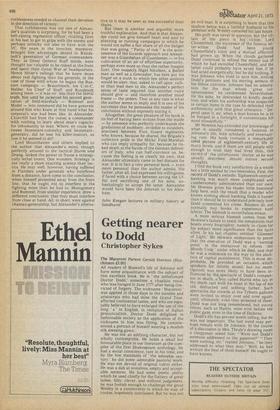Getting nearer to Dodd
Christopher Sykes
The Macaroni Parson Gerald Howson (Hutchinson 0.00)
All readers of Boswell's life of Johnson will have some acquaintance with the subject of this excellent book. He is 'the unfortunate Doctor Dodd,' sometime a chaplain royal, who was hanged in June 1777 after being convicted of forgery. The nickname ' Macaroni ' was applied in those days to the dandies and aristocrats who had done the Grand Tour, affected continental tastes, and who are reputably believed to have enlarged the use of the long ' a' in English, in imitation of Italian pronunciation. Doctor Dodd delighted in fashionable society so the application of the nickname to him was fitting. He commissioned a portrait of himself wearing a modish silk dressing gown.
He was not an edifying character, but not wholly contemptible. He holds a small but honourable place in our literature as the compiler of the first Shakespeare anthology. He had a social conscience, rare in his time, and by the low standards of 'the adorable century' he did some admirable pastoral work. He was not devoid of original talent either. He was a dab at sonorous, empty and acceptable sermons. He had some poetic ability which he used chiefly for the flattery of great ladies. Silly, clever, and without judgement, he was foolish enough to challenge the great Wesley in a controversy in which he was, of course, hopelessly outclassed. But he was not an evil man. It is surprising to learn that this shallow being was a faithful husband to his plebeian wife. Wesley consoled his last hours.
His guilt was never in question, but the villain of the piece is his victim, Lord Chesterfield, the successor of the famous let ter-writer. Dodd had been young Chesterfield's tutor and a mutual affection had grown up. When the clouds gathered Dodd contrived to refund the money out of which he had swindled Chesterfield, and the latter could probably have saved him if he had acted energetically; but he did nothing. It was Johnson who tried to save him, writing Dodd's petitions and his moving sermon to his fellow convicts. Johnson had no admira tion for the man whose 'great vol uptuousness' he condemned. Nevertheless, for his sake, he descended to. kindly decep tion, and when his authorship was suspected in certain items in the case he defended their authenticity with that great utterance: " De pend upon it, sir, when a man knows he is to be hanged in a fortnight, it concentrates his mind wonderfully." Mr Howson has extended our knowledge of what is usually considered a footnote to Johnson's life, with scholarly and entertaining care. His book contains a remarkably vivid picture of eighteenth-century life at many levels, and if there are still people silly enough to wish they had lived then, this record of ' the unfortunate ' doctor, as he was usually described, should induce second thoughts.
I find the book very satisfactory as a whole but a little spoiled by two blemishes. First, the record of Dodd's swindle. Eighteenth-century banking was much more complicated and cumbersomely administrated than our own. Mr Howson gives his reader little historical help here, with the result that a reader who knows nothing about banking finds it harder than it should be to understand precisely how Dodd committed his crime. Readers do not normally buy books to experience hard labour. The blemish is nevertheless minor.
A more serious blemish comes from Mr Howson's failure to resist the temptation that besets every biographer, namely to claim for his subject more significance than the facts allow. In his last chapter, entitled 'Glimmer of Light,' Mr Howson endeavours to prove that the execution of Dodd was a 'turning point' in the endeavour to reform the Bloody Code' under which he died, and that he was a milestone on the way to the abolition of capital punishment. This is most improbable. He provided an occasion which speakers for reform seized, but no more. Opinion was more likely to have been influenced by the spectacle of Dodd's companion in death, a boy called Harris who lay in the death cart with his head in the lap of his old, distracted and sobbing father.. such spectacles the crowds at the Tyburn gallows were invited to enjoy over and over again, until, ultimately, even they sickened of them. Dodd was not long remembered, but young felons, such as Harris, were ever before the public gaze, even in the time of Dickens.
Dodd's life has proved worth telling, but he was not important. The last word may perhaps remain with Dr Johnson. In the course of a discussion in Mrs. Thrale's drawing room a clergyman asked him: "Were not Dodd's sermons addressed to the passions?" "They were nothing, sir," replied Johnson, "be they addressed to what they may." Well, he had written the best of them himself. He ought to have known.


































 Previous page
Previous page